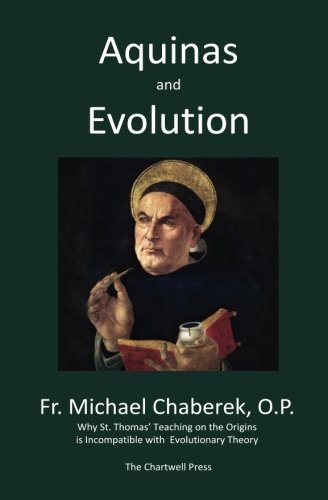How Does St. Thomas Aquinas Approach Evolution?
BOOK PICK: Aquinas and Evolution

AQUINAS AND EVOLUTION
Why St. Thomas’ Teaching on the Origins Is Incompatible With Evolutionary Theory
By Michael Chaberek, OP
The Chartwell Press, 2017
272 pages, $16.95
To order: amazon.com
In his new book Aquinas and Evolution: Why St. Thomas’ Teaching on the Origins Is Incompatible With Evolutionary Theory, Dominican Thomist Father Michael Chaberek explores the areas in which Aquinas’ philosophy seems inconsistent with the theory of evolution, exposing philosophical fault lines in current evolutionary theory. Father Chaberek, the author of Catholicism and Evolution and a contributor to More Than Myth?: Seeking the Full Truth about Genesis, Creation and Evolution, takes on this sacred cow of modern science with clarity, objectivity and intelligence.

In 1950, Pope Pius XII addressed the theory of evolution in Humani Generis, where, after noting that “caution must be used when there is … question of hypotheses” in scientific matters touching on religious truths, he wrote:
the Church does not forbid that, in conformity with the present state of human sciences and sacred theology, research and discussions, on the part of men experienced in both fields, take place with regard to the doctrine of evolution, in as far as it inquires into the origin of the human body as coming from pre-existent and living matter — for the Catholic faith obliges us to hold that souls are immediately created by God.
In addition, Catholics cannot “embrace that opinion which maintains that either after Adam there existed on this earth true men who did not take their origin through natural generation from him as from the first parent of all, or that Adam represents a certain number of first parents.” With these two caveats, Catholics are free to accept, partially accept or reject the theory of evolution, though we would be unwise to forget that even seemingly solid scientific theories have often been disproved by science over time.
In this book, Father Chaberek examines the possible metaphysical difficulties for those theistic evolutionists who maintain that God makes use of evolution “as a secondary or instrumental cause” to produce new species. That leaves him — and us — with the central questions: “Would Thomas allow the transformation of species due to accidental changes? Would he allow universal common ancestry? And is his own concept of the emergence of species compatible with that of modern theories of biological macroevolution?”
In his foreword, Logan Paul Gage, who teaches philosophy at Franciscan University of Steubenville, ascribes much of the effort of Catholic Thomists to reconcile Thomism with Darwinism to a “Galileo Complex.” Father Chaberek, however, dares to explore the following contradictions with:
some of Aquinas’ basic principles: that no being can convey more act than it possesses; that the natures of living beings cannot be transformed via accidental changes, that God created distinct levels of perfection in nature; that Scripture indicates a literal and historical direct creation of Adam and Eve; that secondary causes are not responsible for the creation of species (i.e., the appearance of new kinds of substantial form).
Gage notes that “Father Chaberek rightly treats Darwinian theory as a substantive hypothesis with metaphysical implications. … This is a breath of fresh air, for many Christians today dismiss the very possibility of conflict between Darwinism and the faith by proclaiming that metaphysics (and philosophy generally) can be hermetically sealed off from science.”
This 272-page book is very accessible to non-specialists in science and philosophy. Adopting Aquinas’ own methodology, Father Chaberek opens each section with a question, then lists the evidence against his position, and finally answers the objections he has raised. In our current intolerant intellectual atmosphere, with people quick to bury anyone who disagrees with them under a mountain of insults and ad hominem attacks, this respectful treatment of opposing intellectual ideas is a breath of fresh air.
Father Chaberek embarked upon this project because he thinks that Thomistic scholars who believe Thomism and Darwinism can comfortably coexist wrongly perceive an illusory consistency between Aquinas and Darwinism. Both those who agree and those who disagree should welcome the opportunity to work through his arguments. Catholic scientists, students of science and intellectually curious laypeople should find this book carefully argued, thought-provoking and refreshingly removed from the spirit of the age we happen to live in.
Opus Dei Father C. John McCloskey, a Church historian, writes from Virginia.

















